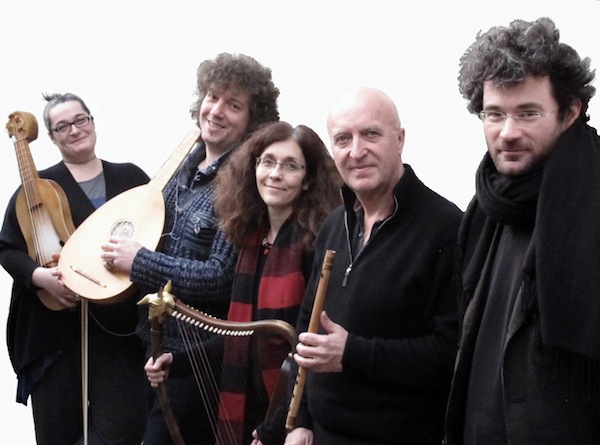Alla Francesca offers a colorful program of medieval Jewish rarities

Alla Francesca performed Sunday afternoon at Corpus Christi Church in the Music Before 1800 series.
The organization calls itself “Music Before 1800” but “Music before 1750” might be more accurate.
Their mission is to perform early music never heard in major concert halls, evangelizing for underserved repertoire. No Mozart or Handel here; Rameau represents about the closest MB1800 gets to “mainstream” concert rep.
Sunday’s concert at Corpus Christi Church in Morningside Heights was true as ever to that goal, offering songs of 13th-century French Jews. The Paris-based ensemble Alla Francesca performed a selection of songs in Old French and in Hebrew, a mix of liturgical, festive, and lyric music. The Hebrew songs, for the most part, have not survived in written form, and so aside from a few instances in which the melody of another song was indicated on a manuscript of the text, the melodies have been “recreated.”
As with many groups who specialize in pre-Renaissance music, Alla Francesca make quite a sight when they enter, tuning up their temperamental menagerie. They are a nimble, flexible ensemble, each musician truly proficient on multiple instruments, allowing them to perform in a variety of different styles and modes with polish. In several wedding songs and dances, the festive, buoyant rhythms and mix of plucked instruments with jangling percussion, as in the anonymous “Deror yiqra,” gave the music a high-stepping folk feel.
Much of the program was given over to songs for voice with simple accompaniment. “Shalfu tzarim,” the first song on Sunday’s program, opened with virtuosic piping to a melody by Moniot de Paris, then showed rich, pulsing strings in the accompaniment. The primary vocalist of the evening—and the only member of the ensemble who did not play another instrument—was the Israeli tenor Lior Leibovici, who brought a clear, beaming sound perfect for liturgical descants.
Leibovici sang with vigor in the energetic love song “Par grant franchise,” where his lilting tenor was accompanied by a freely phrased lute part played by Michaël Grébil. Leibovici was especially affecting in Mahieu le Juif’s “Por autrui movrai mon chant,” a tearful lover’s plea with a lonely accompaniment by Nolwenn Le guern, who played a variety of fiddles with polished technique and musical sensitivity.
Brigitte Lesne was not quite so seamless as a singer, her voice uneven across her phrases, but still gave a few arresting vocal performances on the strength of her musical sense. “Las, las, las, que ferai?”, Jacob’s lament for his son, was moving without being lugubrious, a clear call of sadness which Lesne herself accompanied on a psaltery-harp.
Most striking of all were the items that featured Grébil with his cetera oscura, a kind of bowed cittern with a hair-raising, wispy tone. He first showed off that ethereal sound in “Roi de poer,” a song for the New Year by Gace Brulé, for two voices, recorder, and Grébil’s peculiar instrument. In the eerie introduction, the combination of cittern and recorder was haunting, like a snatch of melody caught on the wind. Pierre Hamon played the recorder with such natural, lyrical ease that it sounded like a third vocal part.
Grébil’s cetera oscura was on display again in “Mout sont il a mechief mis,” a poignant elegy for female voice, with a melody by Châtelain de Coucy. The eerie gloss of the cittern, here amplified by playing sul ponticello, was a powerful accompaniment for Lesne’s dramatic, trance-like singing.
The next Music Before 1800 concert will take place 4 p.m. November 19 in Corpus Crhisti Church. Quicksilver will present “Wonderchamber: A Cabinet of Musical Curiosities from the 17th Century.” mb1800.org


